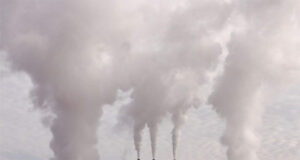 RNS: Air pollution was the second largest cause of death and disability in Bangladesh and cost about 3.9 to 4.00 percent of the country’s GDP, said Dandan Chen, Acting World Bank Country Director for Bangladesh and Bhutan.
RNS: Air pollution was the second largest cause of death and disability in Bangladesh and cost about 3.9 to 4.00 percent of the country’s GDP, said Dandan Chen, Acting World Bank Country Director for Bangladesh and Bhutan.
A World Bank analysis published on December 4 estimates that between 78,000 and 88,000 persons in Bangladesh lost their lives to air pollution-related causes in 2019.
According to the survey, the most polluting sources in Dhaka are huge building sites and constant traffic. Fine particle matter (PM2.5) is 150 percent above the WHO Air Quality Guidelines (AQG) at these locations, roughly equivalent to smoking 1.7 cigarettes per day.
The second highest concentration of PM2.5 levels is near brick kilns in Greater Dhaka, 136 percent above the WHO AQG – equivalent to smoking 1.6 cigarettes per day.
Sylhet is the least polluted division in Bangladesh, while Dhaka is the most polluted division in the country. Between 2018 and 2021, Dhaka maintained its position as the world’s second most polluted city. The pollution levels in the western regions (Khulna and Rajshahi) are significantly higher than in the eastern regions (Sylhet and Chattogram).
According to the report, in addition to local pollution sources, up to one-fifth of the total PM2.5 concentration comes from pollution sources across national borders in the Dhaka division.
Mental health can be negatively impacted by air pollution as well. The incidence of depression is highest in regions that have both significant construction and constant traffic. According to the study’s findings, there is a correlation between a one percent increase in exposure to PM2.5 above the WHO AQG and a twenty percent higher likelihood of depression.
Exposure to high levels of air pollution significantly raises the risks of breathing difficulties, cough, lower respiratory tract infections, depression, and other health conditions. Children under five years, the elderly, and people with comorbidities such as diabetes, heart or respiratory conditions, are most vulnerable, says the World Bank report.
Addressing air pollution is critical for the country’s sustainable and green growth and development. Through analytical work and new investments, the World Bank is helping Bangladesh reduce air pollution, said Chen.



